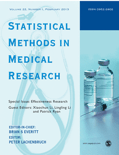
STATISTICAL METHODS IN MEDICAL RESEARCH
Scope & Guideline
Bridging the gap between statistics and healthcare advancements.
Introduction
Aims and Scopes
- Statistical Modeling and Inference:
The journal publishes articles that introduce new statistical models and methods for analyzing medical data, including survival analysis, longitudinal data analysis, and causal inference. - Clinical Trials and Experimental Designs:
A significant focus is on the design and analysis of clinical trials, including adaptive trial designs, sample size determination, and evaluation of treatment effects. - Biostatistics and Epidemiology:
Research in biostatistics and epidemiology is prominent, addressing the statistical challenges in public health studies, disease surveillance, and risk assessment. - Data Integration and Machine Learning:
The journal explores the integration of machine learning techniques with traditional statistical methods to improve predictive modeling and data analysis in medical contexts. - Statistical Methods for Biomarkers and Diagnostic Tests:
There is a consistent emphasis on methods for evaluating biomarkers and diagnostic tests, including receiver operating characteristic analysis and meta-analysis of diagnostic accuracy. - Handling Missing Data and Censoring:
The journal addresses methodologies for dealing with missing data and censoring, which are common challenges in medical research, ensuring robust statistical inference. - Multivariate and Hierarchical Models:
Papers often involve multivariate and hierarchical modeling approaches to capture the complexities of medical data, allowing for more nuanced analyses.
Trending and Emerging
- Bayesian Statistics:
There is a growing trend towards the application of Bayesian methodologies in medical research, reflecting the need for flexible modeling that can incorporate prior information and handle uncertainty effectively. - Machine Learning and Predictive Analytics:
Machine learning techniques are increasingly featured, emphasizing their role in predictive modeling and data analysis, particularly in high-dimensional datasets common in genomics and clinical trials. - Personalized Medicine and Treatment Heterogeneity:
Research focusing on personalized medicine, including individualized treatment effects and precision medicine approaches, is on the rise, indicating a shift towards tailored healthcare solutions. - Longitudinal and Time-to-Event Data Analysis:
There is an increasing emphasis on advanced methods for analyzing longitudinal and time-to-event data, particularly in the context of chronic diseases and treatment follow-up. - Data Integration from Multiple Sources:
Emerging themes include the integration of data from diverse sources, such as electronic health records and genomic data, to provide comprehensive insights into health outcomes. - Complex Survey Design and Analysis:
The discussion around complex survey methodologies is increasing, reflecting the need for robust statistical techniques in analyzing data collected through intricate sampling designs. - Statistical Methods for Health Economics:
There is a growing interest in the application of statistical methods to health economics, particularly in evaluating cost-effectiveness and resource allocation in healthcare.
Declining or Waning
- Traditional Frequentist Approaches:
There appears to be a waning interest in purely frequentist methodologies, as more researchers explore Bayesian methods and machine learning techniques for data analysis. - Basic Statistical Techniques:
Basic statistical techniques, such as simple linear regression and standard hypothesis testing, are being overshadowed by more complex modeling approaches that address the intricacies of medical data. - Standard Meta-Analysis Techniques:
There has been a noticeable decline in publications focusing on standard meta-analysis methods, as researchers increasingly seek more advanced approaches to handle heterogeneity and complex data structures. - Non-Parametric Methods:
Interest in non-parametric methods seems to be decreasing, with a shift towards parametric and semi-parametric models that can leverage additional information from the data. - Single-Outcome Analysis:
The focus on analyzing single outcomes in clinical research is diminishing, as more studies are adopting multi-outcome and multi-dimensional approaches to better reflect clinical realities.
Similar Journals
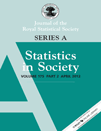
JOURNAL OF THE ROYAL STATISTICAL SOCIETY SERIES A-STATISTICS IN SOCIETY
Empowering Research at the Intersection of Statistics and SocietyJournal of the Royal Statistical Society Series A - Statistics in Society is a premier academic journal published by Oxford University Press, dedicated to advancing the understanding and application of statistical methods in the context of social issues. With an ISSN of 0964-1998 and an E-ISSN of 1467-985X, this journal has consistently been recognized for its high-quality contributions, reflected in its prestigious impact factors and quartile rankings. As of 2023, it holds a Q1 status in Social Sciences (miscellaneous) and notable Q2 rankings in Economics and Econometrics, as well as in Statistics and Probability, illustrating its influence and authority in the relevant fields. Researchers and professionals engaging with this journal can expect rigorous peer-reviewed articles, innovative methodologies, and comprehensive discussions that address contemporary statistical challenges within society. While currently not offering Open Access, the journal is committed to disseminating knowledge that enhances understanding of the interplay between statistics and social dynamics. Spanning from 1988 to 2024, the Journal of the Royal Statistical Society Series A remains a crucial resource for scholars looking to explore the vital intersection of statistical theory and societal applications.
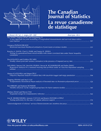
CANADIAN JOURNAL OF STATISTICS-REVUE CANADIENNE DE STATISTIQUE
Elevating Statistical Discourse Across DisciplinesCanadian Journal of Statistics - Revue Canadienne de Statistique is a prestigious publication in the field of statistics, managed by Wiley. Since its inception in 1973, this journal has served as an essential resource for researchers, practitioners, and students, offering insights into a diverse range of statistical methodologies and applications. With its impact reflected in its 2023 categorization as Q2 in Statistics and Probability and Q3 in Statistics, Probability and Uncertainty, the journal stands out among its peers, exemplifying rigorous standards in empirical research. The journal's ISSN is 0319-5724 and its E-ISSN is 1708-945X, providing a robust platform for the dissemination of knowledge in the field. While it does not offer open access, the journal remains highly regarded and well-cited, contributing significantly to the advancement of statistical theory and practice. As it continues to publish cutting-edge research through to 2024, the Canadian Journal of Statistics is a must-read for anyone seeking to stay informed on the latest trends and developments in statistics.
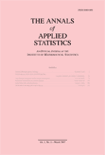
Annals of Applied Statistics
Exploring New Horizons in Probability ApplicationsThe Annals of Applied Statistics, published by the Institute of Mathematical Statistics (IMS), is a leading academic journal that serves as a crucial repository for groundbreaking research in the fields of statistics and probability applications. Since its inception in 2008 and continuing through 2024, this journal has established itself as an influential platform with a notable reputation, boasting a prestigious Q1 classification in 2023 across critical categories such as Modeling and Simulation and Statistics, Probability, and Uncertainty. With its rigorous peer-review process and significant Scopus rankings—including a position of #78 in Statistics and Probability—Annals of Applied Statistics aims to foster innovative statistical methods and their applications in a variety of disciplines. Researchers, professionals, and students interested in the latest advancements in analytical methods will find this journal essential for navigating the evolving landscape of applied statistics. The journal does not offer open access options, ensuring that published content reflects the highest academic standards.

Statistics in Biosciences
Bridging Data and Discovery in the BiosciencesStatistics in Biosciences is a distinguished journal published by Springer, focusing on the innovative interplay between statistical methodologies and biosciences. Established in 2009, this journal aims to provide a platform for the dissemination of cutting-edge research in statistical applications within biochemistry, genetics, and molecular biology. With an impressive impact factor and a distinguished ranking in multiple categories, including Q2 in Biochemistry, Genetics and Molecular Biology (miscellaneous) and Q3 in Statistics and Probability, it serves as a crucial resource for researchers, professionals, and students seeking to deepen their understanding of statistical applications in biological contexts. The journal is accessible through traditional subscription models, ensuring that high-quality research remains available to a wide audience. Featuring contributions that advance statistical theory and application in the biosciences, Statistics in Biosciences is committed to fostering collaboration and innovation in a rapidly evolving scientific landscape.

LIFETIME DATA ANALYSIS
Bridging Disciplines through Innovative Data AnalysisLIFETIME DATA ANALYSIS, published by Springer, stands as a premier journal within the fields of Applied Mathematics and Medicine, with an impressive Q1 category ranking in both disciplines as of 2023. Established in 1995, this journal specializes in the analysis of time-to-event data and related methodologies, providing valuable insights applicable to clinical trials, epidemiology, and survival analysis. With its aim to foster innovative research that enhances statistical methods, LIFETIME DATA ANALYSIS supports the academic community by publishing high-quality articles that cover both theoretical advancements and practical applications. Although it does not offer open access, this journal reaches a wide audience globally, bridging the gap between mathematics and health sciences, and underlining its essential role in advancing interdisciplinary research.

Journal of the Indian Society for Probability and Statistics
Unlocking New Perspectives in Probability and StatisticsJournal of the Indian Society for Probability and Statistics, published by SpringerNature in Germany, is a prominent platform dedicated to advancing the field of statistics and probability. With its E-ISSN of 2364-9569, the journal features rigorous research articles, reviews, and theoretical advancements aimed at promoting the application of statistical methodologies in diverse areas. As part of the academic community since 2016, it has maintained a commendable Q3 ranking in the Statistics and Probability category for 2023, indicating its growing influence and relevance. As the journal aims to foster collaborations among statisticians and probabilists, it serves as an invaluable resource for researchers, professionals, and students looking to deepen their understanding and share innovative ideas. While the journal operates under a subscription model, its commitment to open access publication contributes to the broader dissemination of knowledge in this vital field, further enhancing its importance and utility within the scientific landscape.

Survey Methodology
Transforming data collection with rigorous methodologies.Survey Methodology, published by STATISTICS CANADA, is a prominent academic journal dedicated to the exploration and advancement of survey methods across various domains. First established in 1987, this journal has become a significant resource for researchers, professionals, and students interested in methodological developments in data collection and statistical analysis. With a 2023 Q2 ranking in Modeling and Simulation and a Q3 ranking in Statistics and Probability, Survey Methodology provides a vital platform for disseminating innovative research and practical applications related to survey techniques, contributing to the field's robust discourse. Although it operates on a subscription basis, the journal's archives from its inception to present are invaluable for those seeking to deepen their understanding of contemporary survey practices. By bridging theory and application, Survey Methodology supports the continuous improvement of survey research, thus playing an essential role in shaping data-driven decision-making in both academic and applied settings.

Statistical Theory and Related Fields
Advancing statistical knowledge for a global audience.Statistical Theory and Related Fields is a cutting-edge journal published by Taylor & Francis Ltd, dedicated to advancing the field of statistical theory and its applications across diverse disciplines. With an open access policy introduced in 2022, this journal strives to make high-quality research accessible to a global audience. Its ISSN 2475-4269 and E-ISSN 2475-4277 ensure that it is widely recognized in the academic community. The journal covers crucial topics ranked across various categories, including Q3 in Analysis and Applied Mathematics, and has a growing presence in important subfields of mathematics, as evidenced by its Scopus rankings. This positions it prominently as a valuable resource for researchers, professionals, and students seeking to explore and contribute to statistical theory and its related fields. With a commitment to fostering rigorous theoretical research, as well as practical applications, the journal plays a significant role in shaping the dialogue and advancements in statistics, probability, and computational theories.
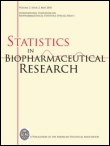
Statistics in Biopharmaceutical Research
Pioneering methodologies for the future of drug development.Statistics in Biopharmaceutical Research, published by Taylor & Francis Inc, is a premier journal that occupies a crucial space in the realms of Pharmaceutical Science and Statistics and Probability. With a robust impact factor affirmed by its Q1 rankings in both categories, the journal stands as a beacon for innovative statistical methodologies and their applications in biopharmaceutical research. Researchers and professionals will find a rich repository of high-quality articles that address contemporary challenges in drug development, clinical trials, and regulatory frameworks. Since its inception in 2011, the journal has continued to foster interdisciplinary collaboration, making significant strides towards enhancing statistical practice in biomedicine. With a commitment to academic rigor and practical relevance, Statistics in Biopharmaceutical Research is an essential resource for anyone looking to advance their understanding and application of statistical techniques in the pharmaceutical industry.

Statistics and Its Interface
Advancing Statistical Knowledge for Interdisciplinary ImpactStatistics and Its Interface, issn 1938-7989, published by INT PRESS BOSTON, INC, is a vital academic journal dedicated to bridging the critical intersection of statistics, applied mathematics, and interdisciplinary research. With its inaugural publication in 2011, this journal has continually aimed to provide a platform for innovative statistical methods and their application across various fields, offering valuable insights for researchers and practitioners alike. While the journal currently operates without an open access model, it maintains an essential position within the scholarly community, evidenced by its 2023 rankings in the third quartile for Applied Mathematics and the fourth quartile for Statistics and Probability. Furthermore, it holds a respectable position in Scopus rankings, reflecting its commitment to quality over quantity. By publishing cutting-edge research, Statistics and Its Interface serves as a critical resource for advancing statistical knowledge and cultivating a deeper understanding of its applications in real-world contexts.